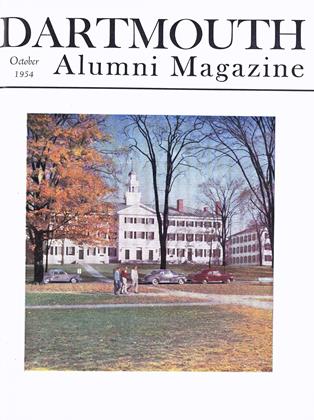By William PlumerFowler '21. Boston: Bruce Humphries, 1954.70 pp. $2.50.
Appledore, Smuttynose, Duck, Cedar, and Malaga: they are islands in the Atlantic off Maine. Star, Londoner's, White Island, and Seavey's: they are off New Hampshire. Blown by gales and hammered by breakers, these nine, the Isles of Shoals, were once celebrated by Celia Thaxter, a lighthouse keeper's daughter who spent most of her 59 years on the tiny granite archipelago. They are celebrated again by a Boston lawyer who lives in Little Boar's Head and commutes, William P. Fowler, who startled the rugged men of his era when as a DOC athlete he walked more miles in one day than any Dartmouth man ever had. To his class, 1921, he has become a legend bordering on the apocryphal.
Landmarks is not the only literary mark which Mr. Fowler has made on the land of New Hampshire. It is his third book of poems. Flashing Wings appeared in 1941; GraniteLedges, 1943. In them all he curtails his undergraduate ambulatory expansiveness and confines himself largely to that tight verse form, the sonnet. The titles of the 46 poems suggest at once his emphasis and his range. In the first section called "Landmarks" one finds "At Godfrey's Ledge" and "Riding on a Sandy Beach at Sunset," "VernaL Equinox" and "Lady's Slipper" (the Cypripedium, you understand, with a pouch-shaped lip found in woods rather than in boudoirs). In the second section, "Man-Marks," he has a poem about a Dartmouth professor who wore a beard, smoked gold-tipped cigarettes, translated Japanese hokku, and made an impression on the 1921 generation: Curtis Hidden Page, nicknamed Concealed (1870-1946). Two pages away there is "Warper of Souls," a German who professed in quite a different fashion: Adolph Hitler, who, Mr. Fowler states, outdid even Judas. Mr. Fowler suggests in "To a Sculptor" that he prefers what Phidias gave Athens and Michael Angelo Rome.
 View Full Issue
View Full Issue
More From This Issue
-
 Feature
Feature"The Working of the Religious Element"
October 1954 By GEORGE H. COLTON '35 -
 Feature
Feature"The Individual and the College"
October 1954 By FRANK PEMBERTON -
 Feature
FeatureNew Faculty Faces
October 1954 -
 Feature
FeatureLiveliest Point of the Summer
October 1954 -
 Feature
FeatureTHIRTEEN IS LUCKY
October 1954 -
 Class Notes
Class Notes1918
October 1954 By ERNEST H. FARLEY, W. CURTIS GLOVER, RICHARD P. WHITE
JOHN HURD '21
-
 Feature
FeatureGood Teaching: A Case Study
February 1956 By JOHN HURD '21 -
 Books
BooksJOHN JAY, FOUNDER OF A STATE AND NATION.
MARCH 1969 By JOHN HURD '21 -
 Books
BooksFurther Mention
JANUARY 1972 By JOHN HURD '21 -
 Books
BooksHOW TO MAKE WINNING YOUR LIFESTYLE.
NOVEMBER 1972 By JOHN HURD '21 -
 Article
ArticleFurther Mention
NOVEMBER 1972 By JOHN HURD '21 -
 Books
BooksQUICK GUIDE TO CHEESE. HOW TO BUY CHEESE HOW TO KEEP CHEESE HOW TO SERVE CHEESE HOW TO SELECT CHEESE.
November 1973 By John Hurd '21
Books
-
 Books
Books"Wholesome Marriage"
NOVEMBER 1927 -
 Books
BooksADVENTURES OF A SLUM FIGHTER.
January 1956 By H. WENTWORTH ELDREDGE '31 -
 Books
BooksBLACK ANGELS OF ATHOS
January 1935 By John Barker Stearns -
 Books
BooksDetours (Passable but Unsafe)
May, 1926 By R. C. N. -
 Books
BooksTHE ISLANDERS.
December 1961 By RICHARD EBERHART '26 -
 Books
BooksHistory Writ Large
MARCH • 1985 By Wayne G. Broehl, Jr.

